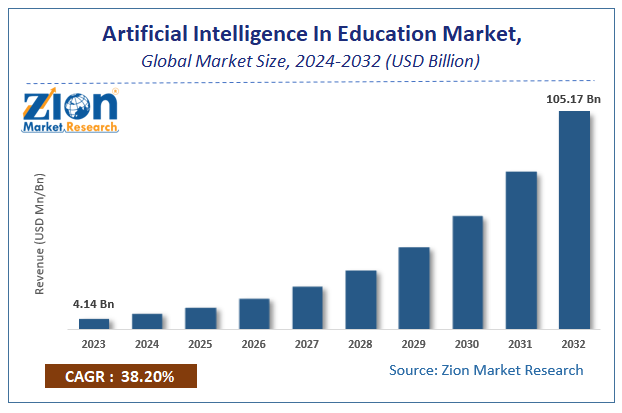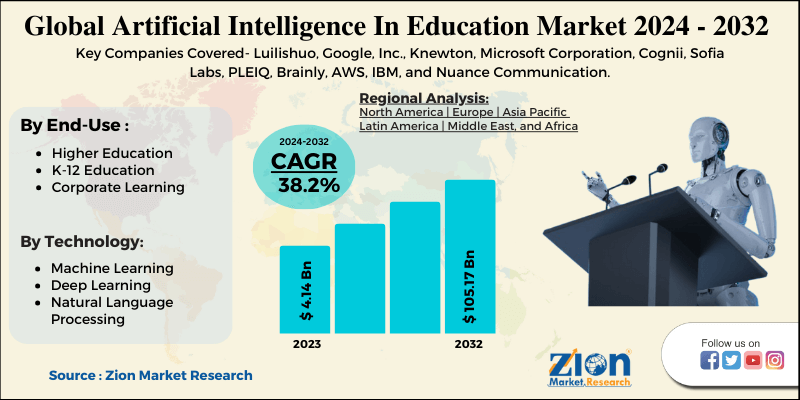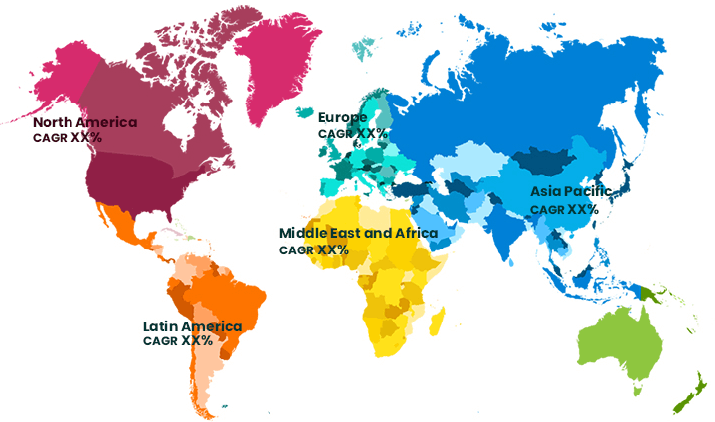Artificial Intelligence In Education Market Size, Share, Growth, Forecast 2032

Artificial Intelligence In Education Market By Technology (Machine Learning, Deep Learning, and Natural Language Processing), By End-Use (Higher Education, K-12 Education, and Corporate Learning), and By Region - Global Industry Perspective, Comprehensive Analysis, and Forecast, 2024 - 2032
| Market Size in 2023 | Market Forecast in 2032 | CAGR (in %) | Base Year |
|---|---|---|---|
| USD 4.14 Billion | USD 105.17 Billion | 38.2% | 2023 |
Artificial Intelligence In Education Market Insights
Zion Market Research has published a report on the global Artificial Intelligence In Education Market, estimating its value at USD 4.14 Billion in 2023, with projections indicating that it will reach USD 105.17 Billion by 2032. The market is expected to expand at a compound annual growth rate (CAGR) of 38.2% over the forecast period 2024-2032.
The report explores the factors fueling market growth, the hitches that could hamper this expansion, and the opportunities that may arise in the Artificial Intelligence In Education Market industry. Additionally, it offers a detailed analysis of how these elements will affect market demand dynamics and market performance throughout the forecast period.
Artificial Intelligence In Education Market: Overview
The report offers valuation and analysis of Artificial Intelligence In Education market on a global as well as regional level. The study offers a comprehensive assessment of the industry competition, limitations, sales estimates, avenues, current & emerging trends, and industry-validated market data. The report offers historical data from 2016 to 2023 along with a forecast from 2023 to 2032 based on value (USD Billion).
Artificial intelligence (AI) in education represents a paradigm change transforming how we teach, learn, and engage with educational materials. At its heart, AI in education refers to the incorporation of intelligent technologies such as machine learning, natural language processing, and computer vision into many areas of the educational process. From individualized learning experiences to automated grading systems, AI is transforming education at all levels from primary schools to higher education institutions and beyond.
What are the Primary Factors Driving the AI in Education Market?
The rapid expansion of online and hybrid learning methods is increasing the demand for AI-powered educational tools and platforms. According to the World Economic Forum, worldwide edtech investments totaled USD 18.66 Billion in 2019, with the overall market for online education expected to reach USD 350 Billion by 2025. According to a UNESCO report, approximately 1.5 billion pupils were affected by school closures in 2020 due to the COVID-19 pandemic, which accelerated the adoption of digital learning platforms. According to the US Department of Education, the number of students enrolled in at least one online education course increased by 5.7% between autumn 2019 and fall 2020, totaling 11.8 million.
AI technologies provide tailored learning routes and training, which better address individual student needs. A study published in the journal npj Science of Learning discovered that AI-powered tailored learning systems can boost student performance by up to 51% when compared to traditional classroom education. According to the U.S. Department of Education’s National Education Technology Plan, individualized learning can boost student engagement and improve learning results. According to the Bill & Melinda Gates Foundation poll, 93% of instructors believe individualized learning is vital for boosting student outcomes.
Furthermore, AI is rapidly being utilized to automate grading, provide real-time feedback, and generate data-driven insights into student performance. According to the National Center for Education Statistics, U.S. teachers devote an average of 31% of their time to assessment and administrative work. AI-powered assessment tools can considerably shorten this time. A World Bank study indicated that AI-based evaluation systems can reduce grading time by up to 90% while maintaining or enhancing accuracy.
AI in Education Market: Synopsis
Artificial intelligence is integrating information technology and education tools. Moreover, growing awareness about benefits of AI-driven education system along with need for improving quality and equity of the education system will create lucrative growth avenues for industry over the upcoming years. Moreover, use of AI tools such as machine learning, deep learning, and natural language processing will create value for teachers and students. AI tools are used most prominently in K12 education and some of the firms are making & promoting the use of these tools in education sector. Citing an instance, during 2017, New Oriental rolled out AI-driven education tool RealSkill in joint venture with FLYTEK, Oriental Fly. This move helped the students in preparing for oral & written tests for TOEFL & IELTS. Such firms are projected to help in creation of better AI-driven education products for building effective education ecosystem globally.
AI in Education Market: Growth Drivers
With COVID pandemic witnessed across the globe, AI is anticipated to bring a paradigm shift in the tools of imparting quality education across the globe and will ensure enhanced connectivity between teachers and students across the globe. In addition to this, AI tools will help students in take online education from foreign universities. All these factors will embellish the growth of AI in education market in the coming decade. Apart from this, AI-driven education institutes impart voice recognition online language education to students. Additionally, these organizations provide image recognizing K12 online education tools & adaptive learning tools that helps the students in image-based searches.
Artificial Intelligence In Education Market: Report Scope
| Report Attributes | Report Details |
|---|---|
| Report Name | Artificial Intelligence In Education Market |
| Market Size in 2023 | USD 4.14 Billion |
| Market Forecast in 2032 | USD 105.17 Billion |
| Growth Rate | CAGR of 38.2% |
| Number of Pages | 160 |
| Key Companies Covered | Luilishuo, Google, Inc., Knewton, Microsoft Corporation, Cognii, Sofia Labs, PLEIQ, Brainly, AWS, IBM, and Nuance Communication |
| Segments Covered | By Technology, By End Use and By Region |
| Regions Covered | North America, Europe, Asia Pacific (APAC), Latin America, Middle East, and Africa (MEA) |
| Base Year | 2023 |
| Historical Year | 2018 to 2022 |
| Forecast Year | 2024 - 2032 |
| Customization Scope | Avail customized purchase options to meet your exact research needs. Request For Customization |
Furthermore, growing need of aspects such as intelligent adaptive education system, data analysis, new virtual learning space, and data privacy are expected to drive market trends. Moreover, AI in education helps in raising the proficiency of teachers due to inculcation of AI tools such as text translation systems, real-time text to speech translation. It will also reduce the admin task of the staff in both schools & colleges as well as of employees of other public & private educational institutes. This, in turn, will carve an inflated growth trajectory for AI in education industry in the foreseeable future.
Artificial Intelligence In Education Market: Competitive Landscape
Key players influencing the business and included in the report are Luilishuo, Google, Inc., Knewton, Microsoft Corporation, Cognii, Sofia Labs, PLEIQ, Brainly, AWS, IBM, and Nuance Communication.
Artificial Intelligence In Education Market: Regional Landscape
Asia Pacific Market To Register Highest Gains Over 2024-2032
The growth of Asia Pacific market during the assessment period is owing to swift digitization in countries such as Japan, China, and India. Apart from this, surge in the web penetration along with large-scale use of smartphones by millennial population as well as students in the sub-continent will sketch new growth graph for AI in education industry over the forecast timeline.
Additionally, with government supporting online education as well as education startups in the countries such as India and China, the market for AI in education is anticipated to witness an accelerated as well as momentous growth in the upcoming years.
Artificial Intelligence In Education Market: Competitive Space
The global Artificial Intelligence In Education market profiles key players such as:
- Luilishuo
- Google, Inc
- Knewton
- Microsoft Corporation
- Cognii
- Sofia Labs
- PLEIQ
- Brainly
- AWS
- IBM
- Nuance Communication
The global Artificial Intelligence In Education Market is segmented as follows:
By End-Use
- Higher Education
- K-12 Education
- Corporate Learning
By Technology
- Machine Learning
- Deep Learning
- Natural Language Processing
By Region
- North America
- The U.S.
- Canada
- Europe
- France
- The UK
- Spain
- Germany
- Italy
- Rest of Europe
- Asia Pacific
- China
- Japan
- India
- South Korea
- Southeast Asia
- Rest of Asia Pacific
- Latin America
- Brazil
- Mexico
- Rest of Latin America
- Middle East & Africa
- GCC
- South Africa
- Rest of Middle East & Africa
Table Of Content
Methodology
FrequentlyAsked Questions
With COVID pandemic witnessed across the globe, AI is anticipated to bring a paradigm shift in the tools of imparting quality education across the globe and will ensure enhanced connectivity between teachers and students across the globe. In addition to this, AI tools will help students in take online education from foreign universities. All these factors will embellish the growth of AI in education market in the coming decade. Apart from this, AI-driven education institutes impart voice recognition online language education to students. Additionally, these organizations provide image recognizing K12 online education tools & adaptive learning tools that helps the students in image-based searches.
Furthermore, growing need of aspects such as intelligent adaptive education system, data analysis, new virtual learning space, and data privacy are expected to drive market trends. Moreover, AI in education helps in raising the proficiency of teachers due to inculcation of AI tools such as text translation systems, real-time text to speech translation. It will also reduce the admin task of the staff in both schools & colleges as well as of employees of other public & private educational institutes. This, in turn, will carve an inflated growth trajectory for AI in education industry in the foreseeable future.
Artificial Intelligence In Education Market, estimating its value at USD 4.14 Billion in 2023, with projections indicating that it will reach USD 105.17 Billion by 2032. The market is expected to expand at a compound annual growth rate (CAGR) of 38.2% over the forecast period 2024-2032.
Asia Pacific is likely to make noteworthy contributions towards overall market revenue. The growth of the industry in the sub-continent over the estimated timespan is attributed to swift digitization in countries such as Japan, China, and India. Apart from this, surge in the web penetration along with large-scale use of smartphones by millennial population as well as students in the sub-continent will sketch new growth graph for AI in education industry over the forecast timeline. Additionally, with government supporting online education as well as education startups in the countries such as India and China, the market for AI in education is anticipated to witness an accelerated as well as momentous growth in the upcoming years.
The key players profiled in the report include are Luilishuo, Google, Inc., Knewton, Microsoft Corporation, Cognii, Sofia Labs, PLEIQ, Brainly, AWS, IBM, and Nuance Communication.
RelatedNews
HappyClients
Zion Market Research
Tel: +1 (302) 444-0166
USA/Canada Toll Free No.+1 (855) 465-4651
3rd Floor,
Mrunal Paradise, Opp Maharaja Hotel,
Pimple Gurav, Pune 411061,
Maharashtra, India
Phone No +91 7768 006 007, +91 7768 006 008
US OFFICE NO +1 (302) 444-0166
US/CAN TOLL FREE +1 (855) 465-4651
Email: sales@zionmarketresearch.com
We have secured system to process your transaction.
Our support available to help you 24 hours a day, five days a week.
Monday - Friday: 9AM - 6PM
Saturday - Sunday: Closed







